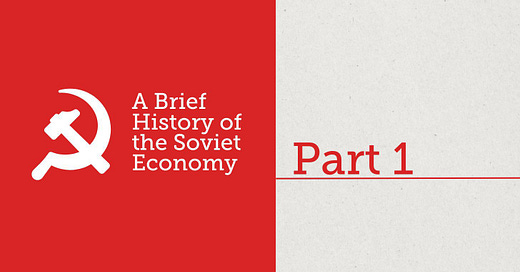A Brief History of the Soviet Economy - Part 1
Building ‘Real Socialism’ - The experiment with alternatives, except for the right one
This is the start of a three-part series exploring the history of the Soviet economy and its modern revival, by Aymen Aulaiwi.
Paid Insider subscribers get exclusive early access to each part.
Part 1 – The experiment with alternatives, except for the right one
Introduction
We are all very familiar with the well-trodden trope of the Leftist commentator stating that ‘the Soviet Union was not real socialism.’ It is a caricature just as persistent and real as that of the neo-liberal commentator posing the rhetorical question: ‘name me one country where socialism has worked.’ For anyone seeking evidence of this cultural phenomenon, I would direct their attention to the socialism workstream of the IEA’s Kristian Niemietz, especially his book Socialism: The Failed Idea That Never Dies. Evidently, the socialist Left has still not learned their history lesson, and what’s even worse, is their opponents still seem incapable of combating their historical revisionism.
From veteran leftist intellectuals like Noam Chomsky to modern commentators such as Hasan Piker, Owen Jones, Ash Sarkar and Grace Blakeley, today’s self-described socialists have become adept at dismissing references to the Soviet Union (or any other state that claimed to be socialist) as merely an example of malicious and warped “state socialism,” rather than the “real socialism” they aspire toward. Yet while they offer some critiques of the authoritarian and bureaucratic elements of the Soviet Union and People’s Republic of China, they are also quick to mention the “impressive industrialisation” and “large improvements in living standards” undertaken by these regimes. (Accomplishments surpassed by capitalist economies with considerably less inefficiency and bloodshed.) All in all, one could summarise their statements as: ‘the Soviet Union was not real socialism, but to the extent that it was, it was good.’
Distinguished Professor of English literature Terry Eagleton beautifully illustrates this viewpoint in his popular 2011 book, Why Marx Was Right. He states that despite all the horrific ‘human cost’ that came with the foundation of the Soviet Union and Communist China, ‘the so-called socialist system had its achievements, too,’ with both countries having ‘dragged their citizens out of economic backwardness into the modern industrial world,’ even if they did so kicking and screaming. Moreover, he praises the ‘cheap housing, fuel, transport’ and ‘impressive social services’ delivered by the socialist states of Eastern Europe, an especially easy task if one ignores the mass shortages and low quality of those provisions. And let us not forget the real prize of those societies – the ‘incomparably greater degree of equality’ – even if that meant equality in the numbers of family members lost to hunger and state-sanctioned violence.
That said, Professor Eagleton does caveat his comments by stating that he still mourns the absence of ‘freedom, democracy, and vegetables in the shop’ in those “so-called socialist” societies (Eagleton, 2011: pp.13-14).
Given this contradictory tactic employed by the modern Left, namely distancing themselves from past socialist regimes while simultaneously praising those regimes’ supposed achievements, it is evident that a new approach is needed to combat their historical revisionism. Rather than just reiterating the extensive list of socialist state failures, those who oppose socialism should offer an intensive, detailed history of specific socialist societies, showing how they were indeed rooted in socialist ideals, and how their failures were linked to those ideals – they were a feature, not a bug. This is precisely what this article series aims to achieve by providing a detailed, yet brief, economic history of the Soviet Union.
More specifically, this three-part series has two primary goals. First, it aims to show that many of the economic policies and structures put in place by the Soviet Union were indeed rooted in Marxist principles. Most of the so-called “aberrations” from those principles, particularly those of the Stalinist period, derived either from the need to accommodate for the realities on the ground or, in fact, attempts to provide “amnesty” for the people on the long and arduous road to communism. Hence, I have labelled this series Building ‘Real Socialism,’ echoing the ideological slogan – ‘actually existing socialism’ – promoted by the Brezhnev administration to describe the society forged by the Soviet state by the 1970s. This slogan directly acknowledged that, while they were unable to achieve the socialist utopia promised by Marx, they built the closest and most realistic socialist society they could create and, most likely, what modern socialists could create today.
Second, the series seeks to equip readers with the tools to recognise the disastrous economic policies adopted by the Soviet Union, some which still have their advocates today. The economic history of the Soviet Union offers a plethora of cautionary tales about how state industrial policy, expropriation of property owners, and the confluence of easy money, but especially anti-market policies, can inflict severe hardship on populations worldwide. Hence, this series provides not only a brief history of the Soviet economy, but also a look at its modern revival and why it must be stopped.
Keep reading with a 7-day free trial
Subscribe to Institute of Economic Affairs | Insider to keep reading this post and get 7 days of free access to the full post archives.




